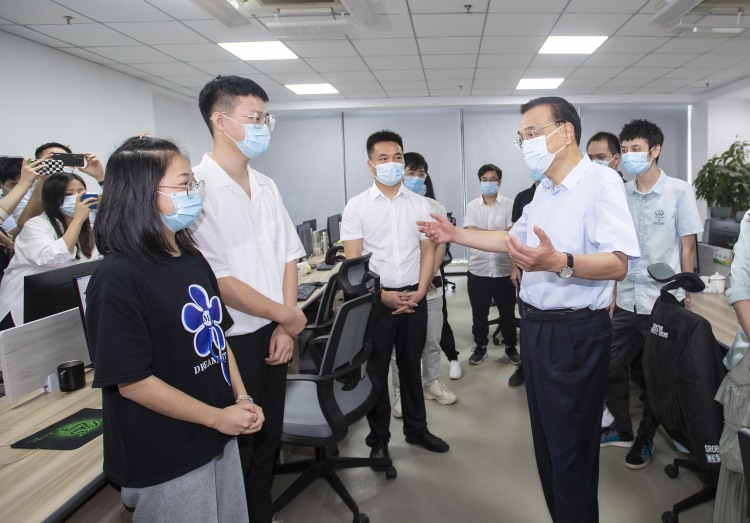
Chinese Premier Stresses Stabilizing Market Entities, Employment, Advancing Opening-Up(1)

Chinese Premier Li Keqiang, also a member of the Standing Committee of the Political Bureau of the Communist Party of China Central Committee, talks with entrepreneurs and fresh college graduates working at an innovation park named Bosssoft in southeast China's Fujian Province, July 7, 2022. (Xinhua/Li Tao)
FUZHOU, July 10 (Xinhua) -- Chinese Premier Li Keqiang has urged efforts to well implement policies to stabilize the development of market entities and employment, and advance opening-up.
Li, also a member of the Standing Committee of the Political Bureau of the Communist Party of China Central Committee, made the remarks during an inspection tour in east China's Fujian Province from Thursday to Friday.
He heard a report on stabilizing employment by the provincial government and visited an innovation park named Bosssoft. Praising the parks' achievements in incubating high-tech enterprises and creating many job opportunities, Li urged the local government to provide funds to help incubators reduce costs, such as rent.
Talking with entrepreneurs and fresh college graduates working at the park, he said the country should encourage mass entrepreneurship and innovation by inspiring more people, especially the youth, to start businesses and make innovations.
While inspecting Lioho Machinery, a Taiwan-funded enterprise, he encouraged the company to gain larger market share through innovations and quality management.
There are dozens of Taiwan-funded firms at the industrial park where Lioho Machinery was based. Li talked with some of the entrepreneurs, welcoming them to invest in the Chinese mainland, stressing to protect their lawful rights and interests, and hoping they would cooperate with companies on the mainland for win-win results.
Li heard a report on foreign trade and investment in Fujian Province and inspected Jinjiang international land port. Noting that ports are a key window for opening up and provide important support for imports and exports, he urged advancing reforms in delegating power, improving regulations, and optimizing the business environment at ports.
He also stressed strictly implementing policies on smoothening logistics, continuing to facilitate customs clearance, and enlarging the capacity of ports in collection and distribution to lower costs for firms, stabilize market expectations, and improve international competitiveness.

